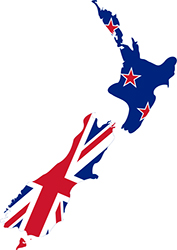By Shelley Rowland* and Katherine Hebditch** --
 After a protracted gestation period, the New Zealand's Patents Act 2013 will take full effect on 13 September 2014. The new Act represents the first major refresh of New Zealand's patent legislation in 60 years, and brings New Zealand patent law into line with most other countries around the world. The likely effect of the new law will be to make it more difficult to obtain patent protection in New Zealand, but patents which are granted should be more robust.
After a protracted gestation period, the New Zealand's Patents Act 2013 will take full effect on 13 September 2014. The new Act represents the first major refresh of New Zealand's patent legislation in 60 years, and brings New Zealand patent law into line with most other countries around the world. The likely effect of the new law will be to make it more difficult to obtain patent protection in New Zealand, but patents which are granted should be more robust.
There is presently a window of opportunity to take advantage of the benefits provided by the current law. In addition, there is likely to be a period of adjustment and uncertainty while the New Zealand patent examiners find the boundaries of the new requirements. Therefore, those who consider New Zealand to be an important or potential market for their innovations should consider filing prior to the new law taking effect.
Significant Changes -- Examination and Validity
There are many changes that will be implemented when the new Act takes effect in September. Some of the main changes introduced will affect examination and how the validity of patent applications is assessed. These include:
• Examiners at the Intellectual Property Office of New Zealand (IPONZ) will be able to assess a patent application for inventive step (obviousness) and utility. They will also be able to rely on prior use when assessing the novelty of any invention. Currently IPONZ does not examine for inventive step or utility and is unable to rely on prior use. However, these may be relied on by a third party to challenge the validity of a patent.
• The novelty and inventive step of an invention will be assessed against matter made available to the public anywhere in the world (absolute novelty), rather than just what was known or used in New Zealand (local novelty).
• The information contained in the specification and claims of prior filed patent applications with an earlier priority date, but which were not published at the time of filing, may be relied on when considering questions of novelty. Currently only the claims of such a prior filed patent application may be relied on.
• The claims of an application must be "supported by" the matter disclosed in the specification. The test for "support" is likely to involve an assessment of whether the specification describes the invention sufficiently to enable a skilled person to carry out the invention over the full scope of the claims. This is likely to be a higher standard than presently applied.
• Some computer program based inventions will not be patentable. In addition, inventions the use of which would be considered to be contrary to public order may be refused protection.
• Presently patent examiners give the applicant the "benefit of the doubt" when deciding whether an application meets the requirements of the Act. Under the new Act, a stricter "balance of probabilities" standard will be applied.
What Should Applicants Do?
There is a window of opportunity to take advantage of the lower examination and validity standards provided by the current Act ahead of implementation of the new Act. In order to do this, applicants will need to file their New Zealand patent applications before 13 September 2014. This means the final day to file convention applications (i.e., non-PCT National Phase) and New Zealand National Phase applications under the current law is Friday 12 September 2014. As the time zone in New Zealand is ahead of most of the rest of the world, applicants should ensure they contact a New Zealand patent attorney by Thursday 11 September 2014 if they want to meet the filing deadline.
If you would like any further information regarding the advantages of filing patent applications before the new law comes into effect, please contact the authors.
This article is intended to summarise potentially complicated legal issues, and is not intended to be a substitute for individual legal advice. Please contact a New Zealand IP professional before acting on any information contained in this publication.
 * Shelley Rowland is a partner at Baldwins Intellectual Property specializing in the field of biotechnology. She has particular experience in the areas of molecular biology, biochemistry, genetic engineering, and immunology.
* Shelley Rowland is a partner at Baldwins Intellectual Property specializing in the field of biotechnology. She has particular experience in the areas of molecular biology, biochemistry, genetic engineering, and immunology.
** Katherine Hebditch is an associate at Baldwins Intellectual Property specializing in the field of chemistry. She has particular experience in the area of human and veterinary pharmaceuticals.
Image of flag and map of New Zealand (above) by Ozhiker, derivative work by Beao, from the Wikipedia Commons under the Creative Commons Attribution-Share Alike 3.0 Unported license.